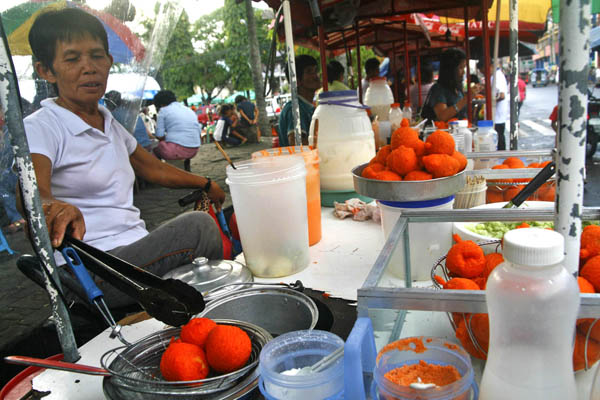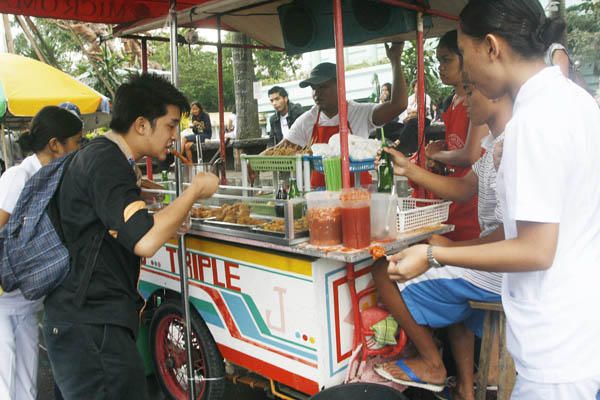DAVAO CITY (MindaNews/30 January) – Vendors are unfazed by reports that street food items being sold in the city are not safe to eat as these may contain harmful bacteria.
Last week, the Department of Science and Technology (DOST), in a joint study with a German non-profit organization, discovered that most of the samples taken from the street foods sold in the urban center are unsafe.

Rufa Baynosa, 60, told MindaNews that she learned about the news from her fellow vendors but assured that the food she is selling is safe.
Baynosa, who has sold kwek-kwek for about a year already, said they are required to get a health card from the City Health Office.
“Upon getting the card we would be examined to make sure we don’t have communicable diseases since we’re selling food,” she said in the vernacular while preparing to fry kwek-kwek at her stall in front of San Pedro Cathedral.
Kwek-kwek, a boiled egg coated with flour and served with cucumber and seaweeds, is one of the street food items identified in the study as contaminated with harmful bacteria like salmonella and E.coli bacteria. It is sold at P10 per serving.
“No matter what they say about the food being sold here in the streets, people will still eat. This is clean and cheap,” a student said as he poured salt and vinegar into the plate filled with kwek-kwek, cucumber and seaweeds.
Gil Austria, a street vendor for at least six years already, shared the same statement saying that the city government has trained them on proper food preparation.
“In 2009, all the vendors, particularly those who availed of the health cards, were trained for free. We were also taught how to dress properly while preparing the food products,” said Austria, who owns three sets of mobile stalls and sells assorted street foods such as fried chicken innards (popularly known as isaw), chicken skin and rice.
He said that despite the reports many people, mostly students and daily wage earners, are still buying from them.
“They prefer these food items because they don’t have to prepare when they get home. For P5 a stick of isaw or chicken skin plus P5 worth of rice, they can already have dinner,” he said in an interview, adding they did not have to invest on cooking utensils.
The city government, he said, has also required the vendors to place the cooked food items inside a glass container. In the past, Austria said, most of them were only using plastic bowls or baskets in displaying their products.
Isaw vendor Pepito Pancho said that if it does not rain, they can sell up to 10 kilos of isaw for seven hours, from 2p.m. to 9p.m.
“Even after that report came out, the people are still patronizing our products because they knew that these are prepared well. They can come to our house and check how we prepare them ,” said Pancho, who has been selling isaw, fried chicken and fried chicken skin for about a year already.

Dietmar Speckmaier, food safety consultant of Centre for International Migration and Development (CIM), last week claimed that the street food samples taken from vendors in the city contained salmonella and E. coli bacteria based on the initial results of the study with the DOST.
“We are not trying however to destroy the sector but find ways to improve the group,” he said, adding they are planning to conduct trainings on food safety for the street food vendors in the city.
CIM is a human resources provider for German Development Cooperation.
At least 40 food samples of street food items like kwek-kwek, fishballs, juices and ice cream were examined by the team for a study that started in November last year. The team surveyed 120 street food vendors in areas near the schools in San Pedro, Bankerohan and Bolton streets.
Salmonella can be acquired through contaminated food, poor hygiene, feces, or uncooked food. The bacteria can survive many weeks and months in optimum conditions and cause diseases like typhoid fever, paratyphoid fever or other food-borne illnesses. Death is not uncommon in salmonella infection.
E. coli, meanwhile, refers to the bacteria that live in the intestines of humans and animals. Though most of the strains are considered harmless, others can cause kidney damage and severe diarrhea and even death. (Keith Bacongco/MindaNews)
